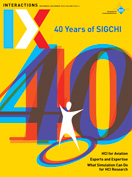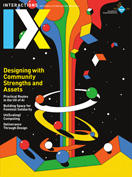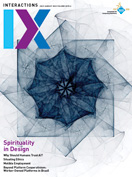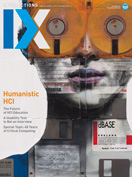Authors:
Kaveh Bazargan, Tuomo Kujala
As the founding chair of the SIGCHI's Iran chapter and assistant professor in HCI in the Department of Information Technology Management at Shahid Beheshti (National) University (of Iran) (SBU) in Tehran, I am honored to write this short contribution. ACM's former chief executive officer John White officially chartered SIGCHI's Iran chapter on October 17, 2014. Currently, we have 47 active members.
The Iran chapter focuses on HCI education as well as user research, usability testing, design and evaluation of sociotechnical systems, human-centered and social computing, user experience management, user experience strategy, and digital transformation. There are active student members: Ten students at SBU's Department of Information Technology Management are now affiliated with the chapter, working on original local and international user research, system design, and user-centered evaluation in the context of student research projects and mandates at the SBU HCI-UX LAB. Through the ACM Distinguished Speaker Program (DSP), we have had guests such as Masaaki Kurosu from the Open University of Japan, chair of the HCI International conference, who graciously advised us on the emerging topic of user engineering. The ACM DSP is one of the ways a local chapter can get support from the larger organization for hosting guest speakers.
One of our very first joint projects was to draft a Persian version of the ACM Code of Ethics and Professional Conduct.
Why create and shape a SICHI Iran chapter? The answer is rooted in the continuous need to shift ICT education and research from a purely "ICT as such" technological determinism paradigm, which is dominated by hardware and software requirements, to a strategic, human-oriented "ICT in use" paradigm with rich and challenging HCI semantic requirements and sociotechnical system requirements derived from communities of users.
Let us recall that according to the ACM Code of Ethics and Professional Conduct (adopted by ACM Council 10/16/92), ACM members should uphold and promote the strategic principle stated in Article 3.4: Ensure that users and those who will be affected by a system have their needs clearly articulated during the assessment and design of requirements; later the system must be validated to meet requirements. As far as I know, the ACM Code of Ethics and Professional Conduct had not yet been translated and officially endorsed in languages other than English. So one of the very first joint projects the SIGCHI Iran chapter members worked on was to draft a Persian version of the ACM Code of Ethics and Professional Conduct. This translation is now available on the SIGCHI Iran chapter website, together with many other local codes of ethics and professional conduct. Based on initial global benchmarking research, it appears that Article 3.4. has no equivalent at the national, regional, or international levels. The Persian version is used to inspire potential and new chapter members with professional and organizational leadership imperatives for improved shared understanding. It would be a pleasure to continue this conversation with SIGCHI community members worldwide to improve the present state of HCI education, research-practice interaction, knowledge, awareness, usage, and global uptake.
Kaveh Bazargan, [email protected]
Tuomo Kujala, [email protected]
Copyright held by authors
The Digital Library is published by the Association for Computing Machinery. Copyright © 2016 ACM, Inc.







Post Comment
No Comments Found